Art is courage, feelings, and dreams, and, on many occasions, it is reality captured with paints, chalk, and pencils, among other types of materials.
Reality is the one from which some escape, while others express it constantly, it is undoubtedly the day-to-day of our lives and this is well known by the artist born in Managua, Nicaragua, but who today after so many years is a citizen of Costa Rica, Gustavo “Guti” Rivera.
We make special mention of reality, due to his work “Pedes in terra ad sidera visus”, rejected in the biennial Marco Aurelio Aguilar 2023 in the Museum of Carthage and then presented in the International Competition of Arts, in France.
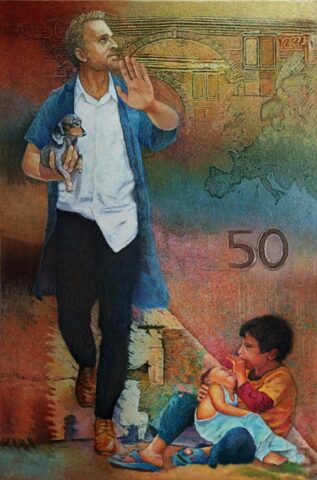
The work in question was technically well executed within the guidelines of the competition, such as originality, creativity, and innovation in the use of materials. The artist Gustavo, used interlining fiber (pylon) glued on an MDF wood sheet of 5mm and not the traditional canvas on a frame.
The painted theme emerged from a deep and objective conceptual memory whose title comes from the Latin motto of a prestigious University in Chile, which translates as “with your feet on the ground and your eyes on the sky”.
Rivera wanted to give it an ironic meaning: “Sometimes it seems that we walk in this world not entrusted to God but, walking with our feet in contact with the harsh reality and with our eyes lost in the sky, ignoring or not wanting to see that reality. In addition to this criticism, there is a strong tendency towards the adoption, care, and protection of pets and nature in general, which leaves aside the most sensitive part of our humanity, which is to adopt an orphan child, to give a little of that excessive love and attention that we prefer to give to a pet. Giving a hand to one who is a hero, for sacrificing his childhood to take care of his younger brother. A call to look down to the ground to see that he does not even rest on a warm wool rug that he does not even get to eat the crumbs of the food that falls from our tables and that our pets lick happily in the comfort of a home,” explained the artist.
For Gustavo, the message of his work was probably very strong and that is why it was rejected in Cartago, “but I will never know, since they don’t give you explanations as to why it was not admitted”. The truth is that, after presenting the work in the Costa Rican zone, he received the good news that it had passed the first curatorial stay (phase) and then, a month later, he received the bad news that it had not been accepted in the second stay.
he then decided to enter the international competition organized by the MAA World Academy of the Arts, of which he has been a registered member for three years. At the beginning of last year (2023), she received the news of her recognition for her work internationally, specifically, in France, “I did not expect such an overwhelming response of praise and congratulations on social networks and less from academic professionals from universities in other countries”.
Since the work was rejected in Cartago, it gave Gustavo the freedom to present it at the Biennial, since it should not be registered elsewhere.
However, the artist also known as “Guti”, who has produced more than 300 works, has presented most of them in Costa Rica:
The 2024-Group exhibition, National Fair Gallery, Palmares 24.
2023-Group exhibition, Esencia Artística, Exhibition Hall, Supreme Court of Justice.
The 2023-Group exhibition, Hotel Real Intercontinental, organized by Sintercafé.
2023-Group exhibition, Art Gallery, Festejos Palmares.
2022-National Contest “Grano de Oro” 36th edition.
2022-Individual exhibition, El Portón Rojo, Pizzería Galería, Costa Rica.
2021-Individual exhibition, Club Union, Costa Rica. “Chromatic Stereometry”.
2020-National Contest “Grano de Oro” 34th edition, Special Prize.
2019-National Contest “Grano de Oro” 33rd edition.
2019-Group exhibition Sueños Marriott Hotel, Herradura, Costa Rica.
2019-Group exhibition Studio Hotel, Santana, Costa Rica, organized by Sintercafé.
2019-Biennial Marco Aurelio Aguilar 2019, Museo Municipal de Cartago.
2019-Individual exhibition “Reticulated Polychromy” National Library.
2019-Individual exhibition “Between engraving and acrylic” Lobby Club Union.
2018-National Contest “Grano de Oro”, Sintercafé 32nd edition, in which he won 1st place in the Regular Format Painting category.
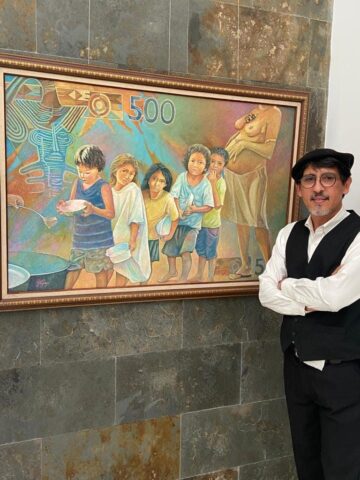
About the artist
Our TCRN team had a pleasant conversation with the painter Gustavo Rivera, who gave more details about his life.
As we mentioned, he is a native of Nicaragua and, due to the earthquake of 1972, his family moved to Costa Rica, since then he adopted Costa Rican citizenship. He spent his childhood in the district of Guadalupe, specifically in the canton of Goicoechea, completing his primary education at the Pilar Jimenez School. “There I had earned a place as the best draftsman and every year they used to grant me to teach the plastic arts class on teacher’s day. I would go from section to section and display all my skills drawing with chalk on the blackboard.”
Just when Gustavo was advancing in his adaptation process in Costa Rica, in 1976 they returned to Nicaragua for 3 years due to a job offer for his father, “my process was abruptly cut short and I experienced the second phase in my artistic evolution there in Nicaragua until we had to return to Costa Rica due to the revolution of 1978”.
For 25 years, the artist has lived in San Isidro, a canton in the province of Heredia with his wife and 3 children.
About the teachings of his parents that come to mind and that he puts into practice today, he emphasized that he comes from a large family made up of 8 siblings and his parents, who raised them under strict discipline, especially in terms of order and cleanliness, “one of the things that most stand out in my personality: I can not paint without my environment being clean and illuminated, although it seems like a joke, my workshop looks more like an art store, so neat and tidy” said Rivera.
In addition to art, Gustavo enjoys playing the guitar, writing stories, short stories, and poetry, and has participated in several literary contests, not to mention his talent for playing chess.
Among his musical tastes, the painter defined himself as a Baetlemaniac, a faithful admirer of Sir Paul McCartney. In literature, as a follower of the late Carlos Luis Safón, author of the masterful trilogy “La Sombra del Viento” and, regarding painting, his favorite artist is M.S. Escher.
If we talk about “Guti’s” work experience, has been focused on graphic design: In 2015, he worked as a web designer and developer at Exodus Advertising; in 2011 he worked as a graphic designer at Dicograf Agencia (Impresos Gráficos); in 2005 he also worked as a graphic designer at CIEURO Advertising Agency and began his work experience in 1999 at Capture Costa Rica.
With painting, he has participated in numerous national and international competitions and biennials.
To mention some of his international exhibitions: Biennial International Art Professionals Awuards (MAA), France, in which he obtained Honorable Mention (2023); International Biennial Print Exhibit: 2022 R.O. C, in Taiwan; solo exhibition, Yila’Ob platform, Agora, in Mexico (2022); Luxemburg Art Prize Biennial, obtaining a certificate of participation (2021); 25th Mosiac Padam Chand Painting Competition, New Delhi, in India, in which he obtained Honorable Mention and the group exhibition “Creative Collaboration for Tolerance and Peace” of the Fine Arts Foundation, in Ecuador (2021).
How does he define art today?
For Rivera, we are on the verge of a major shift in the paradigm of what art is. “There is no defined movement or group of artists that are revolutionizing the history of modern art or that attract artists as in the past, to a revolution that is considered the “New art of the 21st century”; I think the artist has become very egocentric,” he said.
What or who brought him to the world of art, of painting?
The evolution of the painter who was adopted by Costa Rica has been marked by different events, but he was born with art in his veins.
As a child, he strove to draw better than children his age. When at the age of 9 he entered the Casa del Artista, founded by the late Olga Spinach, he did not feel comfortable with the children who doodled or painted things that a normal child would do such as mom, dad, a house… “I used to escape from class or at recess to go to the room of the older students who left their oil paintings on the easels, that smell of turpentine, the palettes, the canvases, all that dazzled me and I wanted to be there and not with the other children” he added.
In 1979, at his insistence and against the norm because he was a minor at the time, he was allowed to be in the class of the older students of drawing and oil painting, under the tutelage of artist Ricardo “El Chino Morales”. He was the youngest of them all.
After studying plastic arts at UACA, he decided to change course and focused fully on the discipline of graphic design, thinking that he would do better so he could be in some advertising agencies. “This introduced me to the world of computers and I kept striving to perfect myself by making rudimentary designs with a PC, which by then was not the right thing to do because Apple was what was professionally used for it. In 25 years, I have experienced different stages ranging from manual illustration, to the new trends of digital art combined with my plastic skills in painting with watercolor, acrylic, oil, and drawing through different techniques”.
Part of his training, in addition to the Casa del Artista and UACAR, has been at the Centro de la Cultura in Managua, Nicaragua, before the Revolution and others in a self-taught way.
His special thanks will always be to his main mentor, the Costa Rican artist Ricardo “El Chino” Morales.
What painting techniques has he worked with?
When asked about the techniques with which he makes each of his works, “Guti” answered: “If you refer to the technique as materials, it will be oil and engraving. If you prefer to style, I would say “Social Realism”. However, I remind you that I am promoting my movement with a view to the art of the 21st century”.
What can you tell us about making art today, what is needed beyond creativity, because now there are so many digital platforms, and times have changed?
In the opinion of artist Gustavo Rivera, design and art in general with digital support, opened a world of possibilities where precision and experimentation are only possible with the help of the computer. “For example, a manual illustration takes time and there is no possibility of changes in the composition unless you start from scratch with those changes. Everything that presents itself as progress and revolution is welcome. I don’t consider myself a fanatic of holding on to the tradition of nineteenth-century art, nor do I consider myself a guardian of orthodoxy in art. I think we have to evolve, start with the academy, experiment with different styles, and be open to new trends in art, as far as technology is concerned,” he said.
In this way, he also highlighted some words of Sir Joshua Reynolds, promoter of the “Great Style” and founder of the Royal Academy of the 18th century: “Licking the copy of nature does not produce a great sack, does not provide new concepts, does not stimulate the viewer’s heart. The ambition of every artist must go further, he must win over the public with the greatness of his ideas and be a seducer of the imagination”.
His works, the most significant ones with which he has had ups and downs
The artist has painted more than 300 works, all have Latin titles as a strategy to hide or avoid susceptibility of the meaning in Spanish, among them: Ignotumfilium (The unknown child); Suntesurientem (They are hungry); Fillibellum (post-war children); Nihil habeo ad dare (I have nothing to give you); Et misericordia (for charity) and the most recent, mentioned above Pedes in terra ad sideravisus (With feet on earth, but the look for the heavens). “The latter was the starting point in the search for an art with which to express my emotional state and the strong desire to speak through color. I made the previous sketches around 2017, then I painted a version as a study that did not satisfy me, and finally at the beginning of this 2023 the final theme,” he emphasized.
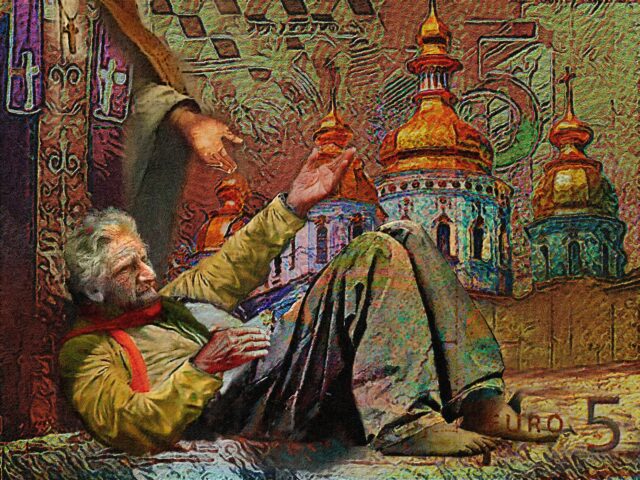
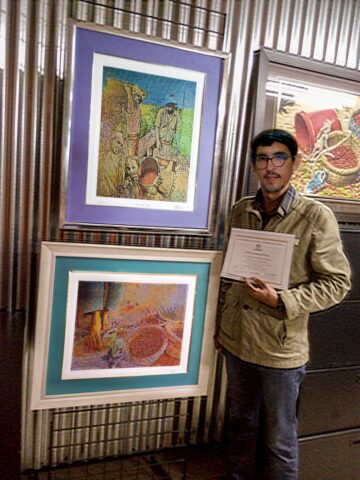
When we touched on his most significant works, to which he has dedicated a lot of time and with which he has had ups and downs, Rivera referred to his proposal for an artistic movement he called “chromatic stereometry” for which he has already had some reports and an article published in the digital magazine of Sicultura of the Ministry of Education.
Said movement, is based on the idea that three-dimensional solids, defined by “Stereometry”, combined with a design of vibrant colors, on geometric patterns of a tessellation (regularity or pattern of figures that completely cover or pave a flat surface), resulting in a new complex and abstract art form that challenges the viewer’s perception in an unforgettable visual experience.
“In each composition, the relationship between form and space is explored, and the use of bright or saturated colors help to enhance the three-dimensional effect of the work, accentuating the dynamism and movement of the complex figures” he detailed a bit.
What does he consider that he has yet to do, to achieve, or what does he still need to learn and paint?
The artist again emphasized “artistic egocentrism”, since for him, everyone wants to present themselves as the ultimate and original, but not allow others to imitate them. “I ask myself why Latin America cannot be the cradle of art, as happened in France with the Impressionists, Italy with the Renaissance, New York today with the MOMA (Museum of Modern Art) or the prestigious museums of the Prado in Spain, Louvre and the Jeu de Paume in France. I believe that it is possible, even to attract great artists to Costa Rica in search of new proposals as a cradle and movement for the XXI century and that is precisely what I want to achieve, not to be recognized for a style or technique, but to attract artists to an artistic movement that leaves a mark in the history of art.
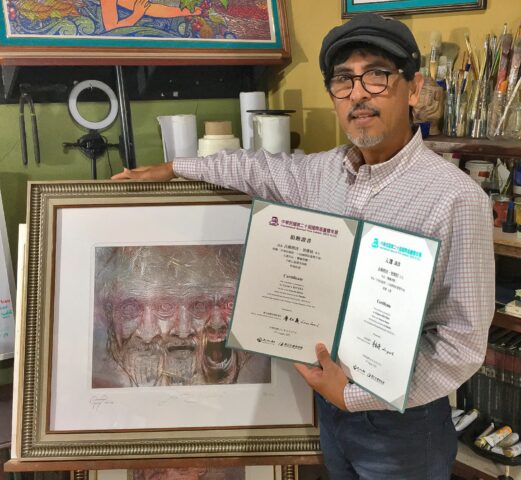
Future projects
As for plans, Rivera wants to continue his Chromatic Stereometry movement. He has just entered his most recent work in the Taiwan Museum of Art’s Biennial of Engraving and Printmaking and, in addition, plans to hold a couple of solo exhibitions later this year.
And so, the artist, ended by quoting a piece of advice given by the famous painter (one of the most important and influential of the 18th century), Joshua Reynolds, about being creative and diligently exploring how to bring something new and beneficial to the culture. Also, “that a degree will not make you an artist, but how important it is not to fall into mediocrity, mired in the darkness of ignorance.”
If you want to know more about the activities of the interesting painter Gustavo “Guti” Rivera, you can visit his website: http://visionartistica.com/, you can follow him on the networks (Facebook): facebook.com/arte.guti and (Instagram)@guti_artista.

